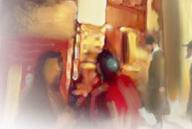 Purim Sameyach!
Purim Sameyach!This blog was inaugurated around
Chanukah time , which is truly the time for spiritual renewal. Chanukah is the time when the enemies of the Jewish people were after our spiritual annihilation, whereas at Purim they wanted to physically wipe us off the map.
And of course nothing has changed. There was a time that Haman was the perpetrator of the evil acts against us, and now in our times, it is his descendents such as Ahma
ghinejad who are having such dreams. At Haman's time the dreams turned to nightmares for him and his clan, so will be at our times. As Jews, we need to do our effort in the physical realm as well, but most importantly we must be steadfast in strengthening our emunah and walking in the path of G-d which was illuminated by our prophets and sages.
So, have a great Purim, take your family and friends, and go to the synagogue on Monday night and hear the Megillah, and be witness to the supernal power of emunah and tshuvah. Please do not forget to observe the 3 important mitzvot of Purim onTuesday morning, the Purim Day:
Matanot L'evyonim - giving gifts or money to at least two poor people
Mishloach Manot - the "sending of portions," giving at least two ready-to-eat foods to a minimum of one person
Seudah - a festive meal. During the meal we are commanded to drink wine until we don't know the difference between "Blessed is Mordechai" and "Cursed is Haman." Although it is a strong tradition to drink, this mitzvah can also be fulfilled by drinking a little and taking a nap - one doesn't know the difference between them while sleeping!
Let us together look at a very interesting and curious point in the Megillat Esther. It is written in the second last sentence of the Megillah:
“All His mighty and powerful acts, and a full account of the greatness of Mordechai, whom the King had promoted, are recorded in the book of chronicles of the Kings of Media and Persia.”It is brought down by our sages of Talmud that the Megillah is telling us a subtle point here. That the Megillah is not teaching us the history; if we are interested in the history of the time, it refers us to the archives of the kings of Media and Persia. What the Megillah is teaching us is that how the Divine Providence manifests itself in the world to bring the redemption of the Jewish people; the redemption which was already foretold by our prophets.
So, I went to the library and got a copy of the archives of the kings of Media and Persia. In fact, much of this material is based on my extensive scholarly research (otherwise known as plagiarizing) of the
ArtSroll Megillah , which provides a fantastic commentary on Purim.
We read in Chapter I of Megillah:
“And it came to pass in the days of Ahasuerus - the Ahasuerus who reigned from Hodu to Cush over a hundred and twenty seven provinces - that in those days, when King Ahasuerus sat on his royal throne which was in Shushan the capital, in the third year of his reign, he made a feast for all his officials and his servants; the army of Persia and Media, the nobles and officials of the provinces being present …”It is brought down in the commentaries that the feast was given by Ahasuerus because he thought that the prophecy of the
70 years of the Babylonian exile had come to an end and therefore, the Temple in Jerusalem was not going to be built, reflecting the idea that G-d had turned away from the Jews, and that certainly was a great reason to celebrate.
So, what is this idea of the prophecy of the
70 years of the Babylonian exile?
52 years after the destruction of the first temple, Cyrus, the famous king of Persia gave order that the Temple be re-built in Jerusalem. Prophet Isaiah had prophesized it about two hundred years before:
“So, said G-d to his anointed, to Cyrus, for the sake of Jacob my servant and Israel my chosen, he shall build My city and he shall free My captives.”This is 2 years before Ahasuerus became King and over four years before the opening scene of Megillat Esther. So, Cyrus gave the order that the Jews might go back to Jerusalem, and only forty-two thousand accepted the offer, but millions did not.
Cyrus moved his royal capital to Shushan, and along with him went prophets Mordechai and Daniel, in order to teach Torah in Elam (the province), but they were not very successful.
Cyrus had a change of heart in the last months of his reign, and he forbade issuing new exit visas to cross the Jordan River, so the rebuilding came to a stop, not as a result of Cyrus' decree, but as a result of the despondency of the Jews who had returned to Jerusalem.
2 years after he ordered the rebuilding of the Temple, Ahasuerus was the king of the Persian Empire, and contrary to the popular belief that he was manipulated, it is brought down about him, that he himself was quite an anti-Semite and hated the Jews, and of course that fact that his queen, Vashti, was a granddaughter of Nebuchadnezzar, the conqueror of Jerusalem did not help dampening the anti-Semitic sentiments of the time. In fact, she insisted that Ahasuerus put an end to the building of the Temple started by Cyrus. Finally a letter arrived from Jerusalem accusing the Jews of planning to revolt after the construction of the Temple was completed. At this point Ahasuerus ordered an end to the work in Jerusalem.
There was another prophecy, brought down by Jeremiah, which was more explicit than that of Isaiah's:
“For says the L-rd, that after 70 years of Babylon are completed, I will remember you and perform my good word concerning you to make you return to this place.” [Jeremiah 29:10]
And also it was brought down by Daniel (who was a contemporary) of Ahasuerus :
“I, Daniel, considered in the books the number of years whereof the word of the L-rd came to Jeremiah the prophet that he would complete 70 years of the ruins of Jerusalem.” [Daniel 9:2]
So, we see that Jeremiah spoke of 70 years of Babylon, and Daniel spoke of 70 years from the destruction of Jerusalem.
Jeremiah's prophecy hung like a sword over the heads of absolute monarchs of the period. To them the Temple was more than just a building. It represented a philosophy of life that was dramatically opposed and incongruent to theirs. The G-d of Israel was recognized to have destroyed kings such as Pharaoh. G-d had said through the Jeremiah's prophecy that Babylon will rule for seventy years and that the ruins of Jerusalem will rot for seventy years. If the prophecy were to come through, the empires would crumble. And since the kings were aware of the prophecy, as long as the prophecy was pending, kings avoided gross acts of disrespect toward G-d. So, they lived in fear and hope. And the hope was that if the 70 years went by without fulfillment of Jeremiah's prophecy, then Jerusalem would never be rebuilt.
Belshazzar, grandson and successor to the throne of Nebuchadnezzar, watched the days go by with trepidation as the end of year seventy grew closer. According to him, the third year of his reign marked the seventieth year of the Babylonian rule. In that year he threw a wild and orgiastic feast and for the first time used the sacred vessels of the Temple. This is something that even his grandfather, Nebuchadnezzar had not done. And he did it because he was not afraid of any consequences anymore, since the seventy years were over. But he was wrong; by morning he was found dead.
Belshazzar had been murdered by Darius, the Mede, and his son-in-law, Cyrus, the Persian. Darius offered the throne to Cyrus, but he refused based on the prophecy by Daniel that the kingdom of Babylon would pass first to Media and then to Persia. So, it is interesting to notice that the prophecy of Jewish prophets had a direct influence on the highest of all affairs of the state.
Darius lasted 1 year, and Cyrus for less than 3. In 3392, (368 BCE) Ahasuerus assumed the throne of the Persian Empire in Shushan. He was also concerned with the 70 years and he had his eye on the calendar. And according to his calculation the 70 years were over with the third year of his reign, in which he threw 180-day feast as we read in the Megillat Esther. His calculation also was wrong, but he was spared from immediate retribution because G-d's plan called for Ahasuerus to rule over the man who would bring fulfillment to Jeremiah's prophecy…
So, what happened to the 70 years?
The true historical milestones were as follows:
Year>Event
3318>Nebuchadnezzar assumes the throne of Babylon (2448 years ago!)
3319>Nebuchadnezzar conquers Judea. Israel becomes part of the Babylonian empire
3327>Nebuchadnezzar exiles King Yechaniah of Judea together with the leading scholars.
3338>Nebuchadnezzar destroys the Temple and exiles the Jewish nation.
3390>Cyrus orders the construction of the Temple.
3392>Ahasuerus becomes king and orders cessation of the construction of the Temple.
3394>Ahasuerus, in the 3rd year of his reign, concludes the 70 years from exile of Yechaniah.
3406>Ahasuerus dies and is succeeded by Darius, son of Esther.
3408>Darius orders the construction of the Temple again. It is 70 years since the destruction of Jerusalem!.
Purim Sameyach!
 Pesah is around the Corner!
Pesah is around the Corner!



